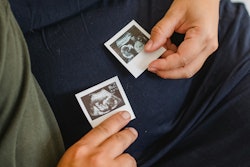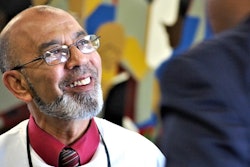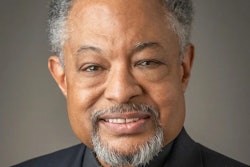In a biting, angry attack on the Bush administration, NAACP chairman Julian Bond equated the president’s handling of Katrina with a “lynching” of Black people, calling it a “deliberate effort to dispossess Black landowners.”
“From the outset, Katrina was about race. America, after all, scrambled spells: ‘I am race.’ That could well be the tagline for Katrina,” Bond said in his opening remarks at the University of Virginia’s first Symposium on Race and Society, held late last week. The Katrina symposium was the first in what UVa. officials hope will be an annual two-day discussion on race in society.
Bond’s speech received a standing ovation from the 200 attendees. However, the subsequent two days of panel discussions made clear that society remains divided. Was governmental incompetence to blame for the nearly 1,900 deaths and $81.2 billion cost of the worst natural disaster ever to strike the United States? Or was Kanye West right when he famously declared that “George Bush doesn’t care about Black people?”
While opinion polls are divided along racial lines, Bond, also a UVa. professor of history, was clear on where he stood: “This blame the victim mentality suggests racial animus,” he said. “It is closely connected to the ignorance that underlies the surprise expressed by many at the level of inequality on display in the Katrina case.”
The question of blame, though, came up repeatedly but drew few firm answers.
“It was a classic bureaucratic mess of dispersed responsibility,” says Christopher Wrobel, a UVa. student doing his undergraduate thesis on New Orleans in the decade leading up to Katrina. “New Orleans’ significance nationally was on the wane, so I’m not surprised that the levees were left uncorrected.”
Wrobel says he hoped the conference would give him insight into the role of race.
Conference participants also explored education, children, law and poverty in sessions like “Medical Relief After Hurricane Katrina,” “How to Build a Robust Minority Business Sector in New Orleans” and “Politics and Race in Post-Katrina New Orleans.”
Bond’s attack extended beyond the breached levees to the reconstruction efforts, as he charged that cronyism, privatization and corporate welfare have impeded rebuilding. Bond noted that the Bush administration has dismantled job safety and wage standards and ended the requirement that federal contractors submit written affirmative action plans.
“Most of these recovery contracts were awarded without adequate competition or oversight,” Bond said, quoting the Institute of Southern Studies. “The government already has identified more than $425 million in corporate fraud in Katrina-related contracts. So we have a good idea who is rebuilding New Orleans — the question is for whom?”
Bond went on to argue that forces are working to make New Orleans a city for wealthy Whites and not the “chocolate city” that New Orleans Mayor Ray Nagin was quoting as saying it should remain.
In one panel discussion, Dr. Marjorie H. Haley, an associate professor of education at George Mason University, charged that the devastated public school system is being rebuilt as mostly charter schools — the highly controversial system of privately run, nonprofit schools that receive government money. “It was a very political effort to create the charter schools. They were created by an ideology with none of the shareholders at the table,” she said.
However, Haley acknowledged that the city’s public schools couldn’t be much worse than they were before Katrina, and major change was desperately needed.
Another George Mason associate professor, Kmt Shockley, said he at first believed Kanye West’s assertions about Bush, but his views changed after Shockley reiterated his beliefs during a radio broadcast in the New Orleans area and was booed off air by Black locals. On his drive back up the East Coast, Shockley listened to a Kanye West song in which the rapper denigrated his Black girlfriend.
“I could only come to the conclusion that Black people don’t like Black people and Kanye West doesn’t like Black people,” Shockley said. “Why are Black people so unloved? Black people have to have a Katrina conscience. We have to take care of ourselves. We should stop isolating ourselves. The system of White supremacy has put in a system in which they don’t even like each other.”
Next year’s conference will examine health disparities among minorities.
© Copyright 2005 by DiverseEducation.com





















